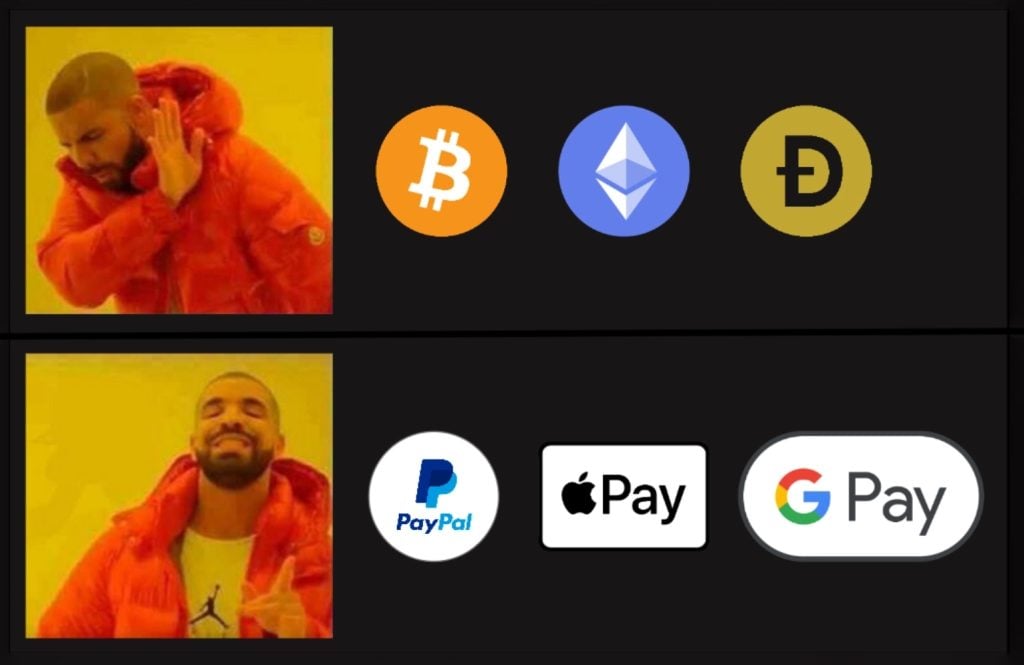Everything you want to know about crypto but are too afraid to ask

It’s vital to offer a comprehensive range of payment options in your eCommerce store. You might have heard of crypto, or cryptocurrency, and wonder if it’s something you should accept.
Here’s our guide to cryptocurrency and whether it’s something you can use to your advantage.
Article topics
- What is cryptocurrency?
- Is an NFT the same as crypto?
- What types of cryptocurrencies are there?
- How can people shop with cryptocurrency?
- Which stores accept cryptocurrency?
- So should I include a cryptocurrency option in my store?
- How do I offer cryptocurrency as an option?
- In summary: don’t worry about crypto just yet
What is cryptocurrency?
Cryptocurrency is a currency that people can use to buy products and services online. It’s created through a process called ‘mining’ where computers are used to solve mathematical problems.
This currency got its name because it uses encryption to verify transactions. When cryptocurrency is transferred to someone, the transaction is added to a public ledger (also known as a ‘blockchain’) that anyone can view online, without revealing the identity of the people involved. This stops the same crypto from being spent multiple times.
Find out more about crypto and eCommerce
Is an NFT the same as crypto?
Not quite. An NFT, or non-fungible token, is a digital asset often purchased using cryptocurrency.
NFTs are unique in that if you buy one, nobody else in the world will have one that’s identical. However, one cryptocurrency coin can be replaced with another cryptocurrency coin of the same value.

What types of cryptocurrencies are there?
Cryptocurrency is decentralised, which means governments or banks do not issue it. Instead, it’s peer-to-peer, meaning it’s passed between individuals, which determines how much each currency is worth. The more demand, the more cryptocurrencies are worth.
(Getting confused? Don’t worry; crypto can be tricky to get your head around!)
The most well-known cryptocurrency is Bitcoin. If an eCommerce platform accepts cryptocurrency, this is likely to be the one they accept.
Other cryptocurrencies include Ethereum, Tether, BNB, Binance, USD Coin, XRP, and the ever memeable Dogecoin.
Companies talk about launching new cryptocurrencies all the time. For example, Meta talked about launching its own digital currency called Diem (formerly Libra), although there is debate over whether this will still happen. There are also rumours that Amazon will launch its own cryptocurrency in the future.
How can people shop with cryptocurrency?
Owners have a crypto wallet where they can store their cryptocurrency online. These are accessible through desktop, and many wallets also have corresponding apps.
If someone wants to buy using cryptocurrency, they choose an eCommerce store that allows them to make payment. The processor then ‘talks’ to the crypto wallet and takes the money from there. The money is then put in the company’s crypto wallet or converted into the currency of its choice.
There are also cryptocurrency debit cards available. Users can load their crypto onto the card and use them in the same way they would a regular payment card. The advantage of this is that these cards can be used offline, as long as a retailer accepts cryptocurrency.
Which stores accept cryptocurrency?
A lot of online stores across the world accept cryptocurrency. The currency is particularly popular in Venezuela, as the country’s government launched its own cryptocurrency called the petro!
Not a lot of UK stores accept crypto at this moment in time. The only store that is on our radar is Lush. However, many stores offer a workaround in that customers can buy a gift card online using crypto.
Some stores used to accept cryptocurrency but no longer do. For example, Expedia used to accept crypto, but stopped in 2018. Often you’ll find that stores accept crypto as a trial and stop accepting it if there is not enough take up.
Some marketplaces offer it on a case-by-case basis. For example, while Etsy doesn’t provide crypto across the platform, it lets sellers offer it as an option. Customers order a product and can then agree to a crypto transaction off-site.
So should I include a cryptocurrency option in my store?
While not everyone uses crypto, those that do like that it’s secure, is processed immediately, and offers low transaction fees. It’s estimated that 4% of people worldwide use crypto, and this figure will increase to 10% by 2030.
So the big question… should you offer cryptocurrency as a payment option on your site?
When choosing your payment options, it’s essential to look at your target audience and review how they prefer to pay for products and services. If the data shows that they lean towards using crypto, then offer it as an option. If they don’t, it’s better to provide payment options that work for them.
Find out more about choosing the right payment option for your website
How do I offer cryptocurrency as an option?
It depends on the eCommerce platform you use. Many platforms like Shopify and WooCommerce offer payment integrations, meaning you can take crypto for purchases. The transaction fees and cryptocurrencies accepted can vary, so do your due diligence before choosing.
If your eCommerce platform doesn’t accept cryptocurrency, there are alternatives. For example, you can send invoices or even build your own payment gateway.
Not sure how to set up cryptocurrency on your site? Drop us a line, and we can take a look for you!

In summary: don’t worry about crypto just yet
We hope this guide has shed some light on cryptocurrency and how people use it to pay for products and services.
Although crypto has grown in popularity over the past few years, its use still pales in significance compared to digital wallets. While 4% of people worldwide use crypto, over half use digital and mobile wallets like PayPal and Google Pay.
So if you’re not letting customers buy with Bitcoin now, you’re not missing out!
Will things change in the future? It’s highly likely. But for the time being, there’s no need to panic.
Why not check out the rest of our articles to learn more about the latest developments in eCommerce technology?


 Back
Back